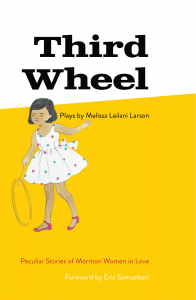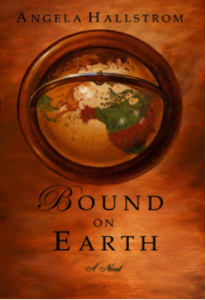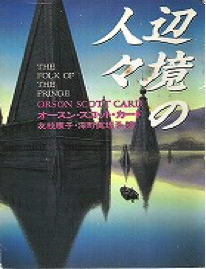From a Twitter thread by @JamesGoldberg
 Third Wheel, a collection of two plays by @mel_leilani billed as “peculiar stories of Mormon women in love,” is still on sale for $5. I got a copy when it came out but went ahead and got more when the book came out. I’ve seen these plays live and they’re breathtaking and I love them and in honor of this sale I’m going to go off for a while with a list of Mormon Lit recommendations and reasons I like each.
Third Wheel, a collection of two plays by @mel_leilani billed as “peculiar stories of Mormon women in love,” is still on sale for $5. I got a copy when it came out but went ahead and got more when the book came out. I’ve seen these plays live and they’re breathtaking and I love them and in honor of this sale I’m going to go off for a while with a list of Mormon Lit recommendations and reasons I like each.I’ll start with these plays. @mel_leilani‘s films (Freetown and Jane & Emma) are more widely known and are both important milestones in Mormon cinema. But Mel is at her very best writing for the intimacy of the stage.
There’s this soliloquy where Claire is walking in cold and shifts from addressing the audience about her experience to talking with God and it’s the most beautiful prayer in Mormon playwrighting history.
I also still think sometimes about the audience talkbacks in 2009 after we produced this play in Provo. The emotional immediacy and accessibility of the play cut straight through the polarized discourse and people with very different life experiences just talked. And listened.
I wish I could have bottled the air we shared those nights.
It was something sacred.
It was something sacred.
 The next play in the collection is called “Pilot Program” and I am not articulate enough to explain what that felt like to see, either.
The next play in the collection is called “Pilot Program” and I am not articulate enough to explain what that felt like to see, either.There’s a gentleness to the way these plays will break your heart.
Pause. Deep breath.
Let the memories settle.
Next title.
Let the memories settle.
Next title.
One of the hardest things about writing Mormon experience is that writing is not kind to scale. Each new character you create adds not only a whole simulated soul’s worth of depth, but also an exponentially expanding web of relationships with other characters.
 From a technical perspective, it is intensely challenging to write big casts of compelling characters. Which makes the familial and communal elements of Mormon life insanely difficult to do justice to.
From a technical perspective, it is intensely challenging to write big casts of compelling characters. Which makes the familial and communal elements of Mormon life insanely difficult to do justice to.I have had multiple conversations with other writers about how Angela Hallstrom’s Bound on Earth would make us jealous if it didn’t do such a total job of humbling us.
amazon.com/Bound-Earth-An…
amazon.com/Bound-Earth-An…
Bound on Earth is about the relationships within a Mormon family over multiple decades and generations and Angela totally pulls it off. It’s got that real, raw feeling and you can taste the different personalities of the characters.
The novel contains way more than it has any right to because each chapter gives you ways to reinterpret what you’ve already read with new depth and perspective so there’s some funky math going on where the number of stories you experience is way more than she wrote on the page.
It is so sad that literary Mormon writing is so niche and the niche is so poorly organized because it feels sometimes like hardly anyone hears about these books. So we end up with all these masterpieces abandoned by their community.
People who want authentic and rich and beautiful writing that resonates with their experience but know not where to find it.
OK: digression time. Have you heard of Sturgeon’s Law?
en.wikipedia.org/wiki/Sturgeon%…
en.wikipedia.org/wiki/Sturgeon%…
This is the idea that 90% of everything is crap. Like: in any genre, 90% of what is written is gonna be bad. 90% of big budget movies suck. 90% of arthouse movies suck. 90% of science fiction sucks just like 90% of what’s in lit mags.
The reason we need a “law” to remind us of this is because people often point to the 90% to dismiss genres they look down upon as categorically worthless.
The satisfaction we as humans find in that sort of categorical condescension may be one of the worst things about us, but it seems pretty hardwired in. Crops up everywhere.
t frustrates me to no end that that’s what Mormon Lit is up against.
People find something they don’t like and they dismiss everything and then feel very clever and superior for never having read Mel or Angela.
Drives me crazy.
People find something they don’t like and they dismiss everything and then feel very clever and superior for never having read Mel or Angela.
Drives me crazy.
*end of rant*
 Next up on my recommendation list: @orsonscottcard‘s Folk of the Fringe.
Next up on my recommendation list: @orsonscottcard‘s Folk of the Fringe.An oldie but a goodie, that one. It’s set in a world where the Cold War went hot and communications technologies somehow got shut out. Society has collapsed.
Mormons are pioneering again.
Mormons are pioneering again.
It’s science fiction, but it’s a really good look in a way at the Mormon past. Card’s pretty clear-eyed about the complexities and rough edges of building a society.
He’s also open to moments of genuine connection and dignity and beauty and provides such iconic images to go with those feelings.
There’s a story about looking for treasure in the submerged Salt Lake temple.
It’s so good.
It’s so good.
I like the reverence people clearly still have for the temple in that story despite the loss. The prayer roll imagery is what stands out to me so much: carving prayers on metal to sink down to a God who dwells in the forgotten depths.
Folk of the Fringe plays with Mormon mythos as well as anything I’ve read. And not just our history. Book of Mormon prophecies/imagery about the future of the Lamanites figure prominently into the book’s structure.
This is the real deal as far as what a culture can hope to expect from its literature. It draws from our shared imagination and gives us distinctive, evocative, lingering visuals. Make us feel in our minds by tapping into what already runs deep there.
Gah. I promised my wife I’d wrap this thread up a while ago.
The Christmas Special from the Chilling Adventures of Sabrina is calling to her and I don’t want to miss out.
 But I will continue this another time with more recommendations.
But I will continue this another time with more recommendations.
The Christmas Special from the Chilling Adventures of Sabrina is calling to her and I don’t want to miss out.
 But I will continue this another time with more recommendations.
But I will continue this another time with more recommendations.In the meantime…thank you for coming to my TED talk.

